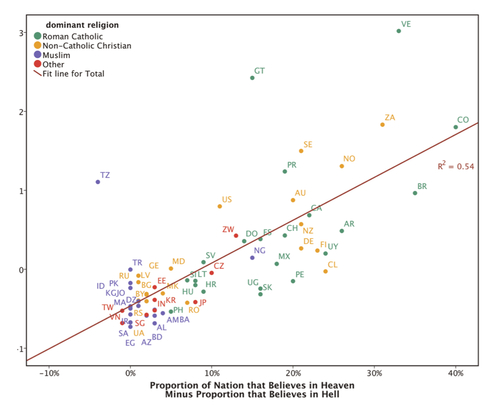 Azim Shariff has found that religion does indeed influence behavior — depending on whether a culture believes in a punishing God or a forgiving God.
Azim Shariff has found that religion does indeed influence behavior — depending on whether a culture believes in a punishing God or a forgiving God.
For as long as people have believed in heaven and hell, a debate has simmered.
Religion makes people act better, supporters have long maintained. Religion poisons everything, an increasingly vocal—and youthful—minority responds.
Long missing from the discord has been empirical evidence. Until now.
Shariff (above), assistant professor of psychology and director of the Culture and Morality Laboratory at the UO, explores the evolutionary origins of moral behavior, with a special focus on the positive and negative social consequences of religions and related cultural systems.
 Graph: Each dot represents a country. Those toward the left have higher percentages of people who believe in hell but not heaven; toward the right, higher percentages who believe in heaven but not hell. The Y (vertical) axis indicates a crime index. Countries with a higher “hell” percentage have a lower crime index.
Graph: Each dot represents a country. Those toward the left have higher percentages of people who believe in hell but not heaven; toward the right, higher percentages who believe in heaven but not hell. The Y (vertical) axis indicates a crime index. Countries with a higher “hell” percentage have a lower crime index.
As psychology has developed tools such as “unconscious priming” to build carefully controlled experiments to measure the psychological impact of religion, he has delved deeply into religion’s influence on generosity, honesty, prejudice and conflict. (Unconscious priming is the use of stimuli to trigger specific thoughts in the unconscious mind, Shariff explained.)
“We need data,” Shariff said. “The main thing I’ve tried to do with my work is add data to the discussion.”
In 2011, Shariff and Ara Norenzayan of the University of British Columbia upended the landscape of accepted religious theory with the first empirical paper to establish an important behavioral divergence between belief in a benevolent God versus belief in a malevolent one.
Belief in God has long been held to encourage moral behavior; Shariff and Norenzayan showed, however, that much depends on God’s temperament— specifically, they found that belief in a vengeful, even angry God was the critical factor. In two studies of forty to sixty undergraduate students, belief in God did not accurately predict the propensity to cheat but viewing God specifically as punishing and less-loving was consistently associated with lower levels of cheating.
“When it comes to deterring transgressions in anonymous situations,” Shariff said, “the divine stick appears to hold considerably more power that the divine carrot.”
Shariff made an even bigger splash last year when he turned to international data on crime.
Using statistics from the United Nations Office on Drugs and Crime and international surveys of religious beliefs, Shariff and Mijke Rhemtulla of the University of Kansas conducted a comprehensive analysis of twenty-six years of data involving 143,197 people in sixty-seven countries.
Their study, which appeared in the Public Library of Science journal PLoS ONE and was quickly picked up by mainstream media, found that criminal activity is lower in societies where people’s religious beliefs contain a strong punitive component versus locations where religious beliefs are more benevolent.
Indeed, a country where many more people believe in heaven than in hell is likely to have a much higher crime rate than one where these beliefs are about equal (see chart). These effects held true when statistically controlling for other cross-national differences such as levels of wealth and inequality.
The discovery supported a growing body of evidence that supernatural punishment emerged as an effective cultural innovation to encourage ethical behavior. Harvard University researchers found in 2003, for example, that gross domestic product was higher in developed countries when people believed in hell more than they did in heaven.
“At this stage, we can only speculate,” Shariff said, “but it’s possible that people who don’t believe in the possibility of punishment in the afterlife feel like they can get away with unethical behavior. There is less of a divine deterrent, and perhaps even a bit of a divine license.”
So what’s the point of heaven?
Shariff’s latest conquest is answering why heaven survives as a religious concept, if not to encourage clean living. Using Gallup World Poll data, he’s found that the degree to which more people in a nation believe in heaven versus those who believe in hell strongly predicts the nation’s global rank on happiness—even how good people feel on a given day. Colombians, for example, scored high for happiness and belief in heaven; Tanzanians landed on the other end of the spectrum. Again, these comparisons statistically control for other economic or social differences between the countries.
“Whereas hell exists to make people act good, heaven exists to make people feel good,” Shariff said. “We’re studying that and trying to see if the data support it.”
-Matt Cooper




 "You are your microbes" is the message from UO biologists in a TED Ed video and TEDx talk.
"You are your microbes" is the message from UO biologists in a TED Ed video and TEDx talk.

